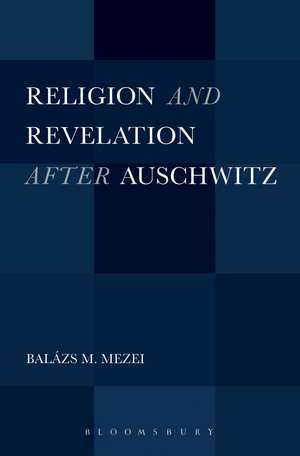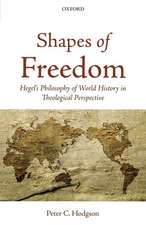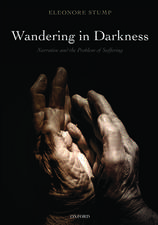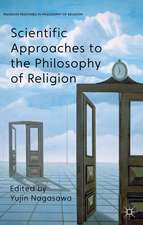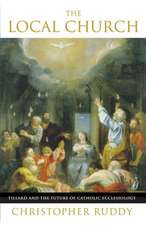Religion and Revelation after Auschwitz
Autor Professor Balázs M. Mezeien Limba Engleză Paperback – 22 oct 2014
| Toate formatele și edițiile | Preț | Express |
|---|---|---|
| Paperback (1) | 259.72 lei 43-57 zile | |
| Bloomsbury Publishing – 22 oct 2014 | 259.72 lei 43-57 zile | |
| Hardback (1) | 835.11 lei 43-57 zile | |
| Bloomsbury Publishing – 5 iun 2013 | 835.11 lei 43-57 zile |
Preț: 259.72 lei
Preț vechi: 296.55 lei
-12% Nou
Puncte Express: 390
Preț estimativ în valută:
49.70€ • 51.70$ • 41.03£
49.70€ • 51.70$ • 41.03£
Carte tipărită la comandă
Livrare economică 14-28 aprilie
Preluare comenzi: 021 569.72.76
Specificații
ISBN-13: 9781628925296
ISBN-10: 1628925299
Pagini: 352
Dimensiuni: 152 x 229 x 19 mm
Greutate: 0.47 kg
Editura: Bloomsbury Publishing
Colecția Bloomsbury Academic
Locul publicării:New York, United States
ISBN-10: 1628925299
Pagini: 352
Dimensiuni: 152 x 229 x 19 mm
Greutate: 0.47 kg
Editura: Bloomsbury Publishing
Colecția Bloomsbury Academic
Locul publicării:New York, United States
Caracteristici
Offers a Central European philosophical perspective on the Holocaust (from the son of survivors)
Notă biografică
Balazs M. Mezei is Professor of Philosophy at Peter Pazmany Catholic University, Hungary. He has widely published on the philosophy of religion, phenomenology, and literary criticism. He is the author of the two-volume Philosophy of Religion (2005, in Hungarian) and, with Barry Smith, The Four Phases of Philosophy (1998).
Cuprins
1. Introduction: Religion and Revelation After Auschwitz / I. Religion / 2. The Crisis of Religion / 3. Theistic Intentionality / 4. Brentano and Husserl on History / 5. The Metaphysics of the Human Body / II. Revelation / 6. Europe and Revelation / 7. Two Models of Revelation / 8. Revelation without Belief /9. Divine Revelation and Human Person / 10. Revelation in the Context of Cultures / III. History / 11. A Phenomenology of Revelation / 12. Aristotle and Nietzsche / 13. Boethius and Human Persons / 14. Austrian Theism and the Catholic Principle / 15. Hildebrand on Evil / IV. The Survival of the University /16. The Crisis of University / 17. Religion, Ethics, and Politics / 18. Art and Religion / 19. The Rehellenization of Reason / 20. Catholic Philosophy in the New Millennium / Bibliography / Index
Recenzii
[T]he most precise, searching, and in-depth investigation of a subject whose importance cannot be overestimated if philosophy is to take seriously the existential challenge of Auschwitz. A graceful, careful and lucid discussion... Mezei's outstanding narrative is unprecedented in scope and detail and will shape future philosophical debates on the relationship between history, personhood, and our individual and collective futures.
[A] valuable work by an especially fertile thinker. Mezei, whose Jewish mother was forced into hiding during the War years, looks frankly and honestly at the challenge posed to contemporary thought by the grievous offenses against human dignity in the 20th century, by the disasters represented by Auschwitz. Here the author addresses the contemporary challenges not only to philosophy, but to the university, art, and religion. Mezei brings to this project a broad and deep knowledge of modern Continental-especially Austrian and German-thought, as well as of its more distant Medieval roots.
This is a unique and utterly original exploration of two of the most compelling questions of our time-the evil of Auschwitz and whether there's a reality that can go beyond without abolishing the brute fact of that evil. A profoundly inclusive thinker drawing on the entire range of Western thought and spirituality, Mezei draws his reader deeper into themselves and toward unexplored horizons beyond.
Auschwitz has come to be considered by many as a stumbling block for continuing philosophy and theology as they have been practised until now. For Mezei, the Shoa is indeed a watershed but it also allows us to rethink the essential theme of divine revelation. Through a large spectrum of thinkers and systems from the late Antiquity up to the beginning of this third millenium, he attempts at working out a new, more radical understanding of what revelation really means. Readers may not agree with this or that position, but they will be deeply impressed by the width of its purpose and the creativity of its vision.
[A] valuable work by an especially fertile thinker. Mezei, whose Jewish mother was forced into hiding during the War years, looks frankly and honestly at the challenge posed to contemporary thought by the grievous offenses against human dignity in the 20th century, by the disasters represented by Auschwitz. Here the author addresses the contemporary challenges not only to philosophy, but to the university, art, and religion. Mezei brings to this project a broad and deep knowledge of modern Continental-especially Austrian and German-thought, as well as of its more distant Medieval roots.
This is a unique and utterly original exploration of two of the most compelling questions of our time-the evil of Auschwitz and whether there's a reality that can go beyond without abolishing the brute fact of that evil. A profoundly inclusive thinker drawing on the entire range of Western thought and spirituality, Mezei draws his reader deeper into themselves and toward unexplored horizons beyond.
Auschwitz has come to be considered by many as a stumbling block for continuing philosophy and theology as they have been practised until now. For Mezei, the Shoa is indeed a watershed but it also allows us to rethink the essential theme of divine revelation. Through a large spectrum of thinkers and systems from the late Antiquity up to the beginning of this third millenium, he attempts at working out a new, more radical understanding of what revelation really means. Readers may not agree with this or that position, but they will be deeply impressed by the width of its purpose and the creativity of its vision.
